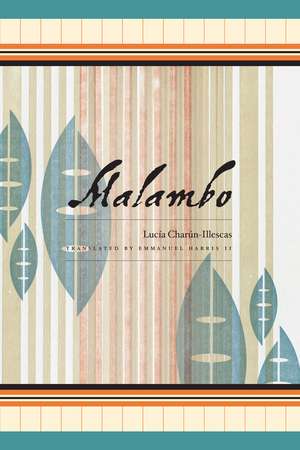Malambo
Autor Lucía Charún-Illescas Traducere de Emmanuel Harris IIen Limba Engleză Paperback – 24 aug 2023
A powerful historical novel set in Peru in the sixteenth and seventeenth centuries.
“In Malambo . . . the Rimac proudly rubs elbows with the freedmen, the cimarrons, and smuggled slaves. . . It runs united to the other subterranean springs underneath Blanket Street, Weavers Lane, and under Jewish Street . . . and Swordmaker’s Lanes.”
The Rimac shapes the narrative of this compelling historical novel that probes the brutal clash of ethnicity, religion, and class in sixteenth- and seventeenth-century Peru. Set against the backdrop of Spanish colonialism and the Spanish Inquisition in the “New World,” Malambo peels back the layers of Peru’s society to focus on the subtle connections among indigenous peoples— Africans, Jews, Christians, and others—whose cultural fusion pervades Latin American history and culture.
At the heart of the novel is Tomason, an African artist living along the Rimac who paints religious murals for the church and his colonial masters. The intermingling of his Yoruba heritage with his life in a Spanish colony transforms him into a griot figure who unearths the deeper truths of his painful and complex experience by sharing it. Other memorable characters’ stories intertwine with Tomason’s tale, developing a narrative that powerfully reflects on the themes of dislocation and enslavement.
Malambo is an unforgettable work that explores the origins of the Afro-Hispanic experience and offers a profound meditation on the forces of history.
“In Malambo . . . the Rimac proudly rubs elbows with the freedmen, the cimarrons, and smuggled slaves. . . It runs united to the other subterranean springs underneath Blanket Street, Weavers Lane, and under Jewish Street . . . and Swordmaker’s Lanes.”
The Rimac shapes the narrative of this compelling historical novel that probes the brutal clash of ethnicity, religion, and class in sixteenth- and seventeenth-century Peru. Set against the backdrop of Spanish colonialism and the Spanish Inquisition in the “New World,” Malambo peels back the layers of Peru’s society to focus on the subtle connections among indigenous peoples— Africans, Jews, Christians, and others—whose cultural fusion pervades Latin American history and culture.
At the heart of the novel is Tomason, an African artist living along the Rimac who paints religious murals for the church and his colonial masters. The intermingling of his Yoruba heritage with his life in a Spanish colony transforms him into a griot figure who unearths the deeper truths of his painful and complex experience by sharing it. Other memorable characters’ stories intertwine with Tomason’s tale, developing a narrative that powerfully reflects on the themes of dislocation and enslavement.
Malambo is an unforgettable work that explores the origins of the Afro-Hispanic experience and offers a profound meditation on the forces of history.
Preț: 135.04 lei
Preț vechi: 163.47 lei
-17% Nou
Puncte Express: 203
Preț estimativ în valută:
25.84€ • 28.16$ • 21.77£
25.84€ • 28.16$ • 21.77£
Carte indisponibilă temporar
Doresc să fiu notificat când acest titlu va fi disponibil:
Se trimite...
Preluare comenzi: 021 569.72.76
Specificații
ISBN-13: 9781961056022
ISBN-10: 196105602X
Pagini: 250
Dimensiuni: 152 x 229 x 36 mm
Greutate: 0.4 kg
Editura: Swan Isle Press
Colecția Swan Isle Press
ISBN-10: 196105602X
Pagini: 250
Dimensiuni: 152 x 229 x 36 mm
Greutate: 0.4 kg
Editura: Swan Isle Press
Colecția Swan Isle Press
Notă biografică
Lucía Charún-Illescas is a writer and journalist. She is also the author of Latinoamerica en Hamburgo and the winner of the Lyra Prize for Short Stories. Malambo is her first novel. She currently lives in Hamburg, Germany.
Cuprins
Malambo
Translator's Note
Glossary
Translator's Note
Glossary
Recenzii
Recipient of Foreword Magazine's Book of the Year Award, Gold rank
"This is an important novel because it is the first work of fiction by an Afro-Peruvian woman, and it is one of very few Afro-Hispanic novels that have been translated into English. . . . The English translation by Emmanuel Harris II does credit to Charun-Illescas's text, for it is rendered in smooth, fluid prose. . . . An excellent translation, which captures the rhythm and flavor of an important work of art. For although it is a fictional account of Afro-Peruvian life in colonial Peru, Malambo calls into question hegemonic assumptions about Spanish American history by underscoring the role that African-descended people played in shaping that history."
"Charún-Illescas strives to give a “past” to a group traditionally oppressed, marginalized, and made invisible in the national literature and histories until recently. Malambo evokes a world of freedom and bondage in which the descendants of Peru’s African ancestors can recognize themselves. . . . The novel grapples with the difficult realities of concubinage and inter- and intraethnic tensions. Malambo’s characters seem to spring to life."
"Charún-Illecas presents a welcome alternative view of the origin of her home continent."
